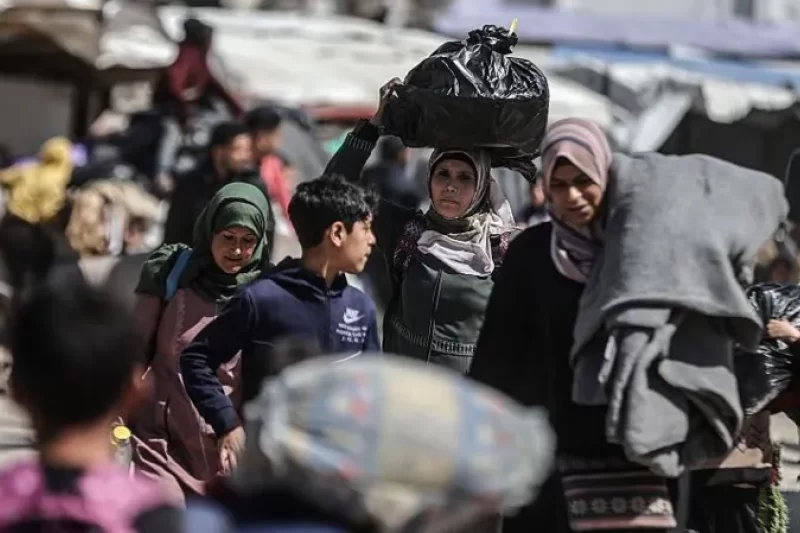Red Cross Chief Says Gaza Is 'Hell on Earth' as Israeli Assault Continues
The head of the International Committee of the Red Cross (ICRC) has told the BBC that Gaza has become "hell on earth", as Israel's military assault there continues.
Mirjana Spoljaric's comments come on the same day the UN human rights office warned that Israel's tactics were threatening the viability of Palestinians continuing to live in Gaza at all.
The ICRC is the guardian of the Geneva Conventions - internationally agreed rules of conduct in war - and normally only speaks confidentially to warring parties when it thinks violations are taking place.
But Ms Spoljaric has now said publicly that what is happening in Gaza is an "extreme hollowing out" of international law.
Israeli bombardment has killed 1,542 people since it renewed the war on 18 March, the Hamas-run health ministry in Gaza says. The Israel Defense Forces (IDF) has also issued evacuation orders that have forced nearly 400,000 people to move. Israel has also imposed a complete blockade on the entry of food, medical supplies and all other goods since 2 March.
Israel insists it always follows international law in Gaza, and has also argued that the particular nature of this conflict, with Hamas fighters hidden among the civilian population, mean collateral damage can sometimes happen.
Israeli ministers insist there is enough food in Gaza and say the bombardment and seizure of territory aims to pressure Hamas into releasing the hostages it is still holding, whom it kidnapped during the 7 October 2023 attack.
Under the fourth Geneva Convention, occupying powers, as Israel is in Gaza, must ensure civilians have food and medicine, and protect hospitals and health workers. The convention also prohibits the forcible transfer of entire populations from occupied territories.
"No state, no party to a conflict... can be exempt from the obligation not to commit war crimes, not to commit genocide, not to commit ethnic cleansing," Ms Spoljaric said.
"These rules apply. They are universal."
Civilians were bearing the brunt of a relentless pursuit of military objectives, she added, being displaced multiple times, and their homes reduced to rubble.
Of 36 recent airstrikes verified by the UN human rights office, all those killed were women and children.
Israel has strenuously denied accusations it is committing genocide or genocidal acts in Gaza.
Israel's military said it was looking into an attack that killed members of one family in the city of Khan Younis and said it had struck 40 "terror targets" across the territory over the past day.
The ICRC's comments are the latest in a chorus of concern coming from the UN and other agencies.
On Friday the UN human rights office spokeswoman Ravina Shamdasani said the "cumulative impact" of the IDF's conduct meant "the office is seriously concerned that Israel appears to be inflicting on Palestinians in Gaza conditions of life increasingly incompatible with their continued existence as a group in Gaza".
Israel was continuing to bomb tents in the al-Mawasi area it had told people to go to for their own safety, she added.
On Tuesday the UN secretary general warned that Israel's blockade of Gaza was violating the Geneva Conventions and the territory was becoming a "killing field". On Monday the heads of six UN aid agencies appealed to the world to act to save the people of Gaza, and to uphold basic international law.
Twenty years ago, in what it called its war on terror, the US suggested that the Geneva Conventions might be outdated in modern warfare, but the ICRC insists they apply in all circumstances.
"It's not transactional," said Ms Spoljaric. "You have to comply with these rules no matter what the other side does."
She appealed for a renewal of the ceasefire, pointing out that during previous pauses in fighting, the ICRC had successfully been able to take Israeli hostages out of Gaza and reunite them with their families.
But she also warned of a growing "dehumanisation" during war, in which the international community was turning away even though it was clear war crimes were being committed.
The Geneva Conventions protecting civilians were created after World War Two, she pointed out, to make sure such dehumanisation never happened again. Diluting or abandoning them sends a dangerous signal that "everything is allowed".
The ICRC believes that sticking with the rules of war can help, eventually, to build a more sustainable peace. Once the fighting stops, the thinking goes, both soldiers and civilians will remember whether those on the other side obeyed international law, or whether they committed atrocities.
But Gaza, Ms Spoljaric believes "will haunt us. It will haunt us for a long time because you cannot undo the suffering… that will last for generations".
The Israeli military launched a campaign to destroy Hamas in response to an unprecedented cross-border attack on 7 October 2023, in which about 1,200 people were killed and 251 others were taken hostage.
More than 50,912 people have been killed in Gaza since then, according to the territory's Hamas-run health ministry.
(Source: BBC)













